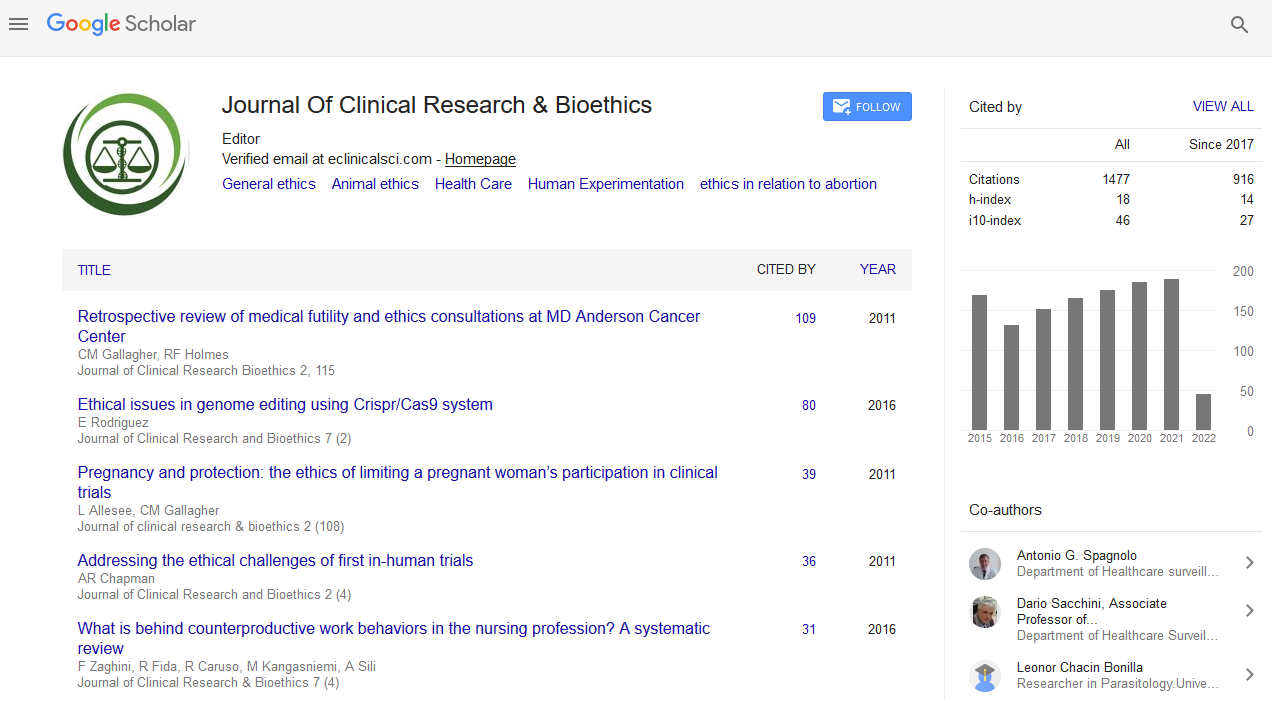PMC/PubMed Indexed Articles
Indexed In
- Open J Gate
- Genamics JournalSeek
- JournalTOCs
- RefSeek
- Hamdard University
- EBSCO A-Z
- OCLC- WorldCat
- Publons
- Geneva Foundation for Medical Education and Research
- Google Scholar
Useful Links
Share This Page
Journal Flyer

Open Access Journals
- Agri and Aquaculture
- Biochemistry
- Bioinformatics & Systems Biology
- Business & Management
- Chemistry
- Clinical Sciences
- Engineering
- Food & Nutrition
- General Science
- Genetics & Molecular Biology
- Immunology & Microbiology
- Medical Sciences
- Neuroscience & Psychology
- Nursing & Health Care
- Pharmaceutical Sciences
Abstract
Knowledge, Attitudes and Practices of Bioethics among Doctors in a Tertiary Care Government Teaching Hospital in India
Misbahuddin Mohammad, Farida Ahmad, Syed Z Rahman, Varun Gupta and Tariq Salman
Human subjects’ participation in medical research has often raised ethical concerns. After Nazi exploitation; various Guidelines & Declarations were prepared, but still unethical behaviour of healthcare practitioners is being reported. After graduation and entering into practical field; sudden exposure to challenges makes it difficult to take decisions, which shows a lacuna in traditional medical training. There are debates about inclusion of practical ethics in medical curricula. Present study assesses the knowledge, attitude and practices of healthcare ethics among doctors in a government teaching hospital. A self-administered structured questionnaire was devised, tested and distributed (n = 172). Faculty and residents were compared using Chi square test and the residents’ responses in different years of residency were compared using Chi square test followed by Kendall’s tau-c test to find correlation. Faculty was more aware of the guidelines. About 77.8% faculty and 48.5% residents were aware of Institutional Ethical Committee (IEC), and about 37.5% from faculty and 23.5% from residents were satisfied with IEC. Faculty encountered ethical problems more often (62.5% vs 45.5%) than residents. Source of knowledge of bioethics was multiple. Departmental lectures were not preferred mode of learning (8.8%). Colleague was most preferred mode of consultation for any problem. Some residents faced ethical problem in publication. All faculty and 94.1% residents felt the need for further education on bioethics. There was negative correlation (-0.3, p<0.001) between the frequency of ethical problems and residency years. There is an urgent need to include formal training of practical ethics and make departmental learning more interesting.


